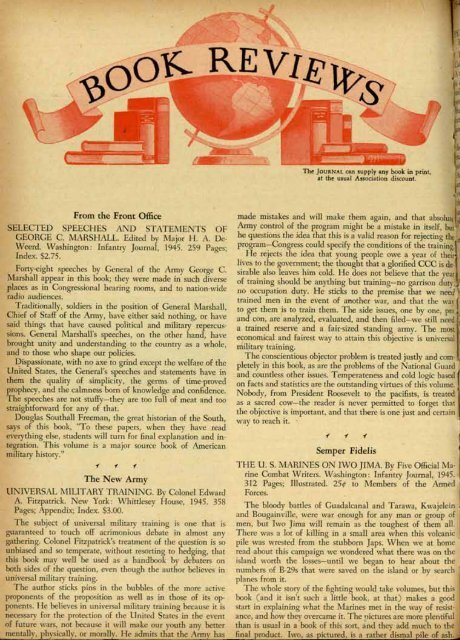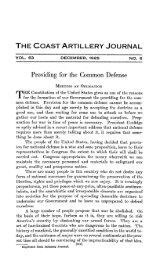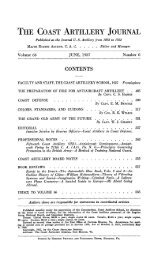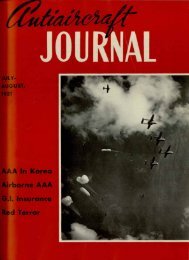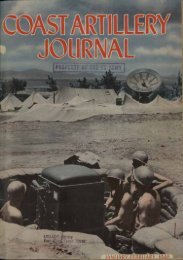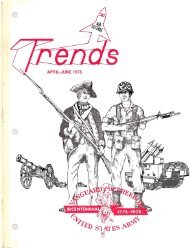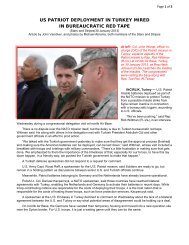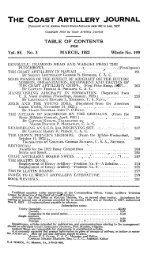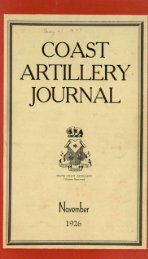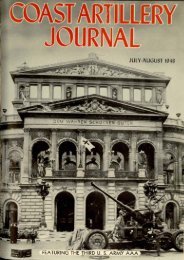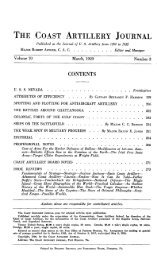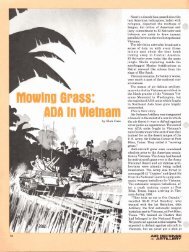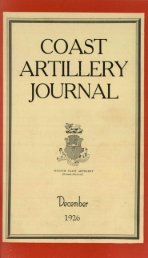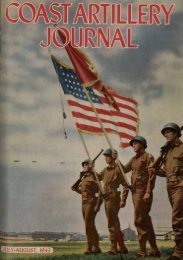September-October - Air Defense Artillery
September-October - Air Defense Artillery
September-October - Air Defense Artillery
Create successful ePaper yourself
Turn your PDF publications into a flip-book with our unique Google optimized e-Paper software.
From the Front Office<br />
SELECTED SPEECHES AND STATEMENTS OF<br />
GEORGE C. MARSHALL. Edited by Major H. A. De-<br />
Weerd. \Vashington: Infantry Journal, 1945. 259 Pages;<br />
Index. $2.75.<br />
Forty-eight speeches by General of the Anny George C.<br />
l'vlarshall appear in this book; they were made in such diverse<br />
places as in Congressional hearing rooms, and to nation-wide<br />
radio audiences.<br />
Traditionally, soldiers in the position of General l\'larshall,<br />
Chief of Staff of the Army, have either said nothing, or have<br />
said things that have caused political and military repercussions.<br />
General Marshall's speeches, on the other hand, have<br />
brought unity and understanding to the country as a whole,<br />
and to those who shape our policies.<br />
Qispassionate, with no axe to grind except the welfare of the<br />
United States, the General's speeches and statements have in<br />
them the quality of simplicity, the germs of time-proved<br />
prophecy, and the calmness born of knowledge and confidence.<br />
The speeches are not stuffy-they are too full of meat and too<br />
straightforward for any of that.<br />
Douglas Southall Freeman, the great historian of the South,<br />
says of this book, "To these papers, when they have read<br />
everything else, students will turn for final explanation and integration.<br />
This volume is a major source book of American<br />
military history."<br />
The New Army<br />
UNIVERSAL MILITARY TRAINING. By Colonel Edward<br />
A. Fitzpatrick. New York: Whittlesey House, 1945. 358<br />
Pages; Appendix; Index. $3.00.<br />
The subject of universal military training is one that is<br />
guaranteed to touch off acrimonious debate in almost any<br />
gathering. Colonel Fitzpatrick's treatment of the question is so<br />
unbiased and so temperate, without resorting to hedging, that<br />
this book may well be used as a handbook by debaters on<br />
both sides of the question, even though the author believes in<br />
universal military training.<br />
The author sticks pins in the bubbles of the more active<br />
proponents of the proposition as well as in those of its opponents.<br />
He believes in universal military training because it is<br />
necessary for the protection of the United States in the event<br />
of future wars, not because it will make our youth any better<br />
mentally, physically, or mo~ He admits that the~12ny has<br />
f<br />
The JOURNAL can supply any book in print,<br />
at the usual Association discount.<br />
l.<br />
~~<br />
made mistakes and will make them again, and that absolute p<br />
Army control of the program might be a mistake in itself, but<br />
he questions the idea that this is a valid reason for rejecting the m<br />
program-Congress could specify the conditions of the training.l<br />
He rejects the idea that young people owe a year of their<br />
lives to the government; the thought that a glorified CCC is de.\<br />
sirable also leaves him cold. He does not believe that the year<br />
of training should be anything but training-no garrison dut)',<br />
no occupation duty. He sticks to the premise that we need<br />
trained men in the event of another war, and that the way 1<br />
to get them is to train them. The side issues, one by one, pro .<br />
and con, are analyzed, evaluated, and then filed-we still need I<br />
a trained reserve and a fair-sized standing army. The most I<br />
economical and fairest way to attain this objective is universal s<br />
military training. I<br />
The conscientious objector problem is treated justly and com. "<br />
pletely in this book, as are the problems of the National Guard<br />
and countless other issues. Temperateness and cold logic based {<br />
on facts and statistics are the outstanding virtues of this volume. !<br />
Nobody, from President Roosevelt to the pacifists, is treated !<br />
as a sacred cow-the reader is never permitted to forget that<br />
the objective is important, and that there is one just and certain<br />
way to reach it. .<br />
Semper Fide1is<br />
THE U. S. MARINES ON IWO JIMA. By Five Official Marine<br />
Combat Writers. Washington: Infantry Journal, 1945.<br />
312 Pages; Illustrated. 25~ to Members of the Armed<br />
Forces. I<br />
The bloody battles of Guadalcanal and Tarawa, Kwajelein •<br />
and Bougainville, were war enough for any man or group of<br />
men, but Iwo Jima will remain as the toughest of them all. I<br />
There was a lot of killing in a small area when this volcanic<br />
pile was wrested from the stubborn Japs. When we at home ~<br />
read about this campaign we wondered what there was on the<br />
island worth the losses-until we began to hear about the<br />
numbers of B-29s that were saved on the island or by search ~<br />
planes from it.<br />
The whole story of the fighting would take volumes, but this<br />
book (and it isn't such a little book, at that) makes a good<br />
start in explaining what the Marines met in the way of resistance,<br />
and how they overcame it. The ~)ictures are more plentiful<br />
than is usual in a book of this sort, and they add much to the<br />
final product. Iwo, as ictured, is a rather dismal ile of ash.


